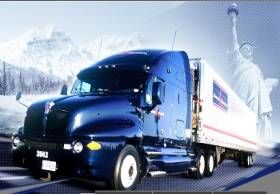Rookie Mistakes
Topic 5948 | Page 1

Excellent comments and practices!

ButtonUp, super tips appreciate your posts!! You are awesome! Thnx
Thanks! I always think of stuff when I am driving that I could share, then I forget about it when I have a chance to post. We're always encouraged to be thorough, but if some real world examples help anyone then awesome!
I also like seeing how some of the situations in Ice Road Truckers are remedied. I am still trying to figure out exactly how that dude got his fan to work by pouring oil in the air line?
I think I need to check some local vocational schools and see about taking a diesel mechanic course... couldn't hurt!

Its a "reality TV show" which means certain part s are staged so take what you see with a grain of salt.

Great examples. I like to stick to a routine and never deviate from it. The easiest way to make mistakes is when you're in a hurry or to tired. I always double check everything with a walk around once I'm ready to roll.
New Reply:
New! Check out our help videos for a better understanding of our forum features

















Preview:








 TT On Facebook
TT On Facebook
So, I admit, I watch Ice Road Truckers. I watched a few seasons before I went to trucking school, and recently started catching up on the remaining ones.
Most of these drivers have years and years of experience. Yet, I have seen them high-hook trailers, drop trailers when the 5th-wheel wasn't locked properly, grind gears, miss gears, put the air lines on backwards, and probably other stuff I can't remember right now.
The reason I am bringing this up is for a couple reasons. New drivers don't beat yourself up too much when you make a mistake. Even veterans make mistakes. The other thing is to always check what you're doing to avoid these situations. I used to bowl a lot, and one of the things that brings success in bowling is the pre-shot routine. Your pre-trip inpection, mid-trip, post-trip, generally whenever you can, is much the same. Repeating the same routine before each shot (trip, leg of trip, etc.) builds consistency. You want to be consistent in making sure your equipment is safe, and your load is secure.
I used to brag to myself how I had never made some of these "rookie mistakes." Then, no sooner than my chest puffed out, I would screw up somehow. It took over a year for some, two years for other mistakes to be made.
I had never dropped a trailer with the landing gear up. Then I did it. Twice. Luckily, I always pull away slowly, and was able to catch it before it hit the ground.
I had never pulled away from a dropped trailer without unhooking the airlines. Then I did it. Twice. Luckily, I always look back there to make sure there aren't any problems, and I caught it and fixed it before any potential damage was done.
Those situations wouldn't have happened if I had completed my routine. In all those situations there was something unique to the situation which screwed my routine up, something that caused me to do steps out of order, and miss a step. I can tell you that since those things happened, I will not hesitate to get back out of the truck, and double-check that the airlines are disconnected and the landing gear is down.
I had never tried to start at an intersection in reverse. Then I did it. Twice. Luckily, I always keep my foot-brake engaged until I feel the engine start to pull, and I was able to tell I was in reverse and fix it before I moved backward. I attribute this to going back and forth between my car and truck a lot. I have also tried to back the car up in first gear a time or two. The solution? Stick to my pre-shot routine. Am I in the correct gear? Correct range? Am I even in the vehicle I think I'm in (lol).
I had never high-hooked a trailer. Then I did it. Once. Even though I realized the trailer was too high, and hit the brake, it was too late, and the 5th-wheel popped up right behind the pin. Luckily I was able to crank the trailer up high enough to resolve the situation. I have heard stories where other drivers have done this and weren't able to remedy it quite so easily. Not stories I would want to be part of. I didn't follow my pre-shot routine. If I am not 100% certain the trailer is low enough, I get out and look, and drop the trailer a little. I get out and look before hooking now more than not. Also, drivers I work with have done this and damaged their truck because it hit the trailer and had it reported as an accident! If I have an accident, I lose a good bonus at the end of the year. Plus, accidents are never good. Ever.
I had never pulled away from a trailer and dropped it because the 5th-wheel wasn't locked properly. I still haven't. That's the one thing I always do. Always... is check to make sure I am hooked securely. I have seen several drivers drop their trailers. I always tug the trailer when I hook to it. Twice. I make sure that second tug the truck moves enough to lose the connection if it's not secure. The first thing I do when I get out of the truck is take my flashlight and get under the trailer and visually confirm it is locked in properly. Even in the daylight, I take my flashlight with me just in case, because sometimes you can't see well even in the daytime. I look at the handle and make sure it is locked in fully. The drivers on Ice Road Truckers that dropped their trailers didn't check them. The one that did check, well he showed the ice that had frozen there that looked like metal jaws, and he thought it was locked. I can see how that can happen. But, if he had looked at the handle to make sure it was in all the way, would this have happened? I don't know I wasn't there, but I would think the handle would be sticking out a little if not fully if it wasn't fully locked. I see a lot of drivers hook, then look, but not tug. I have pulled away a couple times on the SECOND tug. I would always recommend tugging the trailer at least twice.
Always check yourself. Stick to the routine.
One tip I might add, is, when I hook up to a trailer, I always put air to the trailer and flip on all the lights, then get out and walk around it. Of course I am looking to make sure all the lights function properly, but the other thing is I am listening for air leaks. I also stick my ear next to the glad hands to make sure I don't hear any air escaping from there, either. I have picked up a lot of trailers with air leaks that drivers simply didn't know about because they didn't put air to the trailer and check it before they took off.
Dm:
Dispatcher, Fleet Manager, Driver Manager
The primary person a driver communicates with at his/her company. A dispatcher can play many roles, depending on the company's structure. Dispatchers may assign freight, file requests for home time, relay messages between the driver and management, inform customer service of any delays, change appointment times, and report information to the load planners.TWIC:
Transportation Worker Identification Credential
Truck drivers who regularly pick up from or deliver to the shipping ports will often be required to carry a TWIC card.
Your TWIC is a tamper-resistant biometric card which acts as both your identification in secure areas, as well as an indicator of you having passed the necessary security clearance. TWIC cards are valid for five years. The issuance of TWIC cards is overseen by the Transportation Security Administration and the Department of Homeland Security.
HOS:
Hours Of Service
HOS refers to the logbook hours of service regulations.